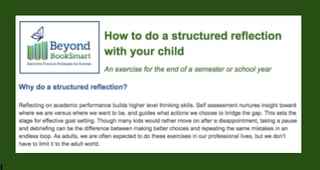Summer can be an ideal time to plant seeds for growth in the future. But why use this down-time to  discuss goals, or work on skills, when the last thing your child wants to think about is school?
discuss goals, or work on skills, when the last thing your child wants to think about is school?
When September comes around, if struggling students have not been expanding their skillset, they start back to school with the same challenges they faced last year but without any new tactics for dealing with those same academic problems. And, of course, a new grade presents increased expectations across the board. Problems with, say, managing a long term project in 8th grade become more serious challenges as a freshman in high school: in addition to those long term projects are now essays and exams that fall on the same due date. That ineffective skill set for middle school demands becomes a real liability in high school.
When students can shine a light on their Executive Function skills over these less structured summer months, they can ponder different possibilities with the benefit of time on their side. It can be easier to process new tools and strategies when you have the time to listen and practice!
4 Approaches for Resistant Students
#1 Model and Narrate
Is time management a persistent challenge for your child? Model using a calendar to plan your week. For a low key way to give children or teens a glimpse into planning, let them hear and see how you manage your time. Taking time to narrate while adding to the family calendar together or conspicuously working (out loud) on your planner at the kitchen table can provide an opportunity to model time management and problem solving. Recent articles and books tout the many benefits of narrating for your child what you are doing. When you talk about the planning, prioritizing, and time management tasks you silently do in your head every day, you help to create a template for your children to internalize and apply to their own lives.
#2 Celebrate Small Successes
What seems like small steps in the right direction in terms of Executive Functioning can be great opportunities to acknowledge and congratulate your child for developing and testing out new skills. Small accomplishments like organizing a work area, or completing a DIY project are building skills of focus and planning. Persisting with a challenging or "boring" summer job or day camp experience are reasons to celebrate, too. Also, since most students naturally enjoy novelty, they can be open to learning new tools for being productive, especially if it’s in the form of a game or other cell phone app. A resistant student who becomes willing to experiment with a fun productivity app such as Forest is a “small win” too!
#3 Start Habits to Moderate Screentime
While cell phones can be hugely useful planning tools and timers, many people have a tendency to waste a little time here and there on social media or other sites. Students can fall prey to these challenges, sometimes more than adults, as they are still learning self-discipline and how to limit technology use. Setting aside your own phones during family time, perhaps leaving the phone on another floor of the house or on Do Not Disturb mode frequently, are steps parents can take to model controlled use of technology. Moderating screentime habits help us (and our children) to stay present and engaged, while modeling healthy limits around technology.
#4 Pause for a Reflection
If your child is willing, try this structured recap exercise to begin the conversation about preparing for a better academic year in the fall. When your child identifies an area that has been a challenge in the past year, approach it like a detective solving a problem. It can be fun to research and evaluate solutions to keeping track of homework to be passed in, overcoming test anxiety, or managing online distractions. Instead of forcing your child to use a particular strategy of an adult’s choosing, the student becomes like a smart consumer evaluating options and making choices based on personal preferences - this increases the likelihood that a student will actually use a new strategy when the time comes.
Leaving resistant students totally in their comfort zone during summer months may gain smiles in the short term; however, after a while it can be like sitting in a drained backyard pool with no water and no ladder. It’s hard to progress without models, a clear path for improvement, and methods to move forward. Working on your child’s Executive Function skills in the summer with gentle and fun approaches can help to dive beneath that veneer of laziness or apathy that young people sometimes display when they lack confidence in their abilities. Creating that library for success over the summer supports the confidence and endurance your child needs for their educational journey ahead.
Learn how to do a structured reflection with your child using our step-by-step guide below.

Lauren Saunders is an Executive Function Coach at Beyond BookSmart and has been a college writing tutor and a secondary classroom teacher. Lauren holds a Masters in Education and has over ten years of experience helping students overcome challenges to succeed at their goals. With a background instructing Social Studies and English courses, she has also written a book for children and enjoys being a mentor and advocate for students as they discover their potential. She lives in Massachusetts with her husband and son.

